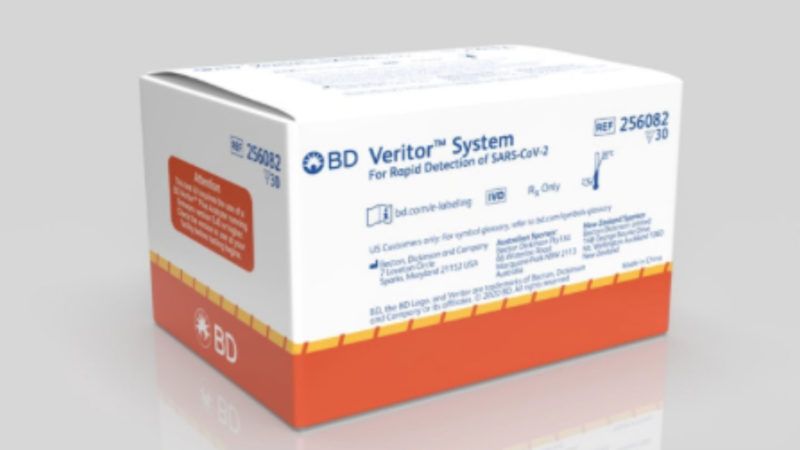To Get Americans Safely Back to Work and Play, We Need Cheap and Plentiful At-home COVID-19 Testing
Enable people to act responsibly toward their neighbors and co-workers.

A hand-held 15-minute COVID-19 antigen test has received emergency use authorization from the Food and Drug Administration, announced medical technology company Becton Dickinson (BD) in a press release today. The test works by detecting the presence of coronavirus proteins using specific antibodies embedded on a test strip coated with nasal swab samples, which is then inserted into BD's proprietary cell phone-sized BD Veritor System platform.
One huge advantage is that the test can detect COVID-19 infections not only in patients showing symptoms but also in pre-symptomatic and asymptomatic people. There are more than 25,000 of the testing machines already located in hospitals, clinics, urgent care centers, retail pharmacies, and doctor's offices around the country.
Becton Dickinson's testing machines sell for about $300, and the tests themselves are about $20 each. This compares to at-home molecular diagnostic tests that cost more than $100 and take more than two to three days to obtain results from offsite laboratories. The company says that it will roll out up to 10 million tests by the end of September and that it is working toward the capacity to manufacture 2 million a week.
While BD's new COVID-19 test is certainly a helpful step forward, much more (and even cheaper) antigen testing is needed to control the pandemic and get people back to work, argued an op-ed last week in The New York Times.
I made exactly the same case back in May: "Testing yourself and your family every day for COVID-19 with a cheap, easy-to-use, 10-minute test could be the game-changer for crushing the epidemic and getting everybody safely back to work and play. Widespread deployment of home antigen testing could make this scenario possible."
Basically, COVID-19 antigen tests would work much the same way that at-home pregnancy and HIV paper strip tests work now. A fast positive test would enable infected people to voluntarily, quickly self-isolate, and thus break the chains of infection that are fueling the epidemic.
The Times op-ed suggests that fast at-home tests would enable people to act responsibly to protect themselves, their families, their neighbors, fellow bar patrons, and co-workers from this scourge:
Would everyone take a paper-strip test every day? Here market incentives will surely help. Once they are provided to all, employers would likely require their workers to take time-dated pictures of their negative test results before coming to work. Colleges would require students to do the same before coming to class. Restaurants could accept reservations only if accompanied by negative-test pictures. In short, everyone will have an incentive to test themselves daily to participate fully in the economy and return to normal life.
Once paper strips' efficacy is definitively proved and they are cleared by the F.D.A., Congress can quickly authorize the production and distribution, for free, of a year's supply to all Americans. Then we'll have not only a true day-to-day sense of Covid-19's path. We'll also have a far better means to quickly contain and end this terrible plague.
How much would such testing cost? The good news is that other companies are working to create antigen tests that cost as little as $1. At that price, daily testing for a year by 300 million Americans would amount to roughly $110 billion. However, weekly testing by nearly everybody would probably be more than sufficient to crush the epidemic, and that would cost around $15 billion. That testing price tag would be a bargain when considering that the Congress has already passed legislation authorizing more than $3 trillion in various forms of coronavirus aid.


Show Comments (214)